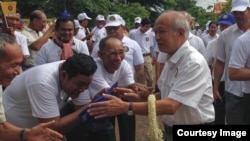After assuming the banned Cambodia National Rescue Party’s seats in the National Assembly this week, the royalist Funcinpec party has claimed Cambodian democracy is healthy and their presence in the legislature will allow them to solve major national issues.
Funcinpec received the majority of seats vacated by the CNRP, while the ruling Cambodian People’s Party and two minor parties also received seats. The Supreme Court ordered the CNRP dissolved earlier this month in a contentious case that has drawn widespread criticism from the international community and support from Beijing.
Nheb Bunchin, a Funcinpec MP for Battambang province, told VOA Khmer that the party’s leader, Prince Norodom Ranariddh, was pleased at being given the opportunity to sit in parliament.
“He was very happy because he has restored the political situation and kept political stability. He gets to develop [the country] and the people will enjoy all freedoms. So we see that whenever a major political crisis happens, Funcinpec will always step in,” he said.
When asked about people viewing Funcinpec’s decision to assume the CNRP’s seats in parliament as anti-democratic, he said, “On the contrary ... Funcinpec is not opportunistic. It’s about principle and the rule of law. If we have a chance to restore stability for the people, farmers and the nation, I think it’s a good thing."
“It’s wrong for people to say that democracy in Cambodia is dead. It’s being implemented smoothly.”
Following the dissolution of the CNRP on November 16, the National Election Committee (NEC) moved to redistribute its seats to unelected politicians from minor parties that did not win enough votes at the 2013 election to sit in parliament.
Funcinpec gained 41 of the CNRP’s 55 seats, with the Cambodian Nationality Party (CNP) gaining two and the Khmer Economic Development Party (KEDP) being allocated one seat. The League for Democracy Party and the Khmer Anti-Poverty party rejected the combined 11 seats they were offered, which went to the ruling Cambodian People’s Party, bringing its total to 79.
In 1993, Funcinpec won a majority in the U.N.-administered elections, but was forced to share power with Hun Sen. Support for the party dropped over the years as it succumbed to internal disputes. Prince Ranariddh was expelled from the party in 2006 but later returned to lead the party once more.
CNP and KEDP representatives could not be reached for comment.
Yoeung Sotheara, an election monitor with NGO Comfrel, said the allocation of a minority of parliamentary seats was intended to satisfy “some regulations and the spirit of the constitution” while the real power remained with Hun Sen and the CPP.
Unelected Royalist Party Lawmakers Claim Cambodian Democracy Strengthened By Opposition Party’s Dissolution
- Hul Reaksmey
- VOA Khmer

A Funcinpec spokesperson said it is wrong for Cambodian people to see the move as anti-democratic.
PHNOM PENH —








